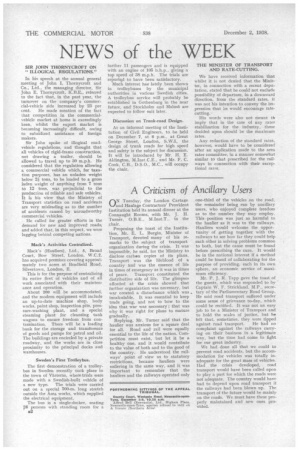A Criticism of Ancillary Users O N Tuesday, the London Cartage
Page 36

If you've noticed an error in this article please click here to report it so we can fix it.
and Haulage Contractors' Provident Institution held its annual dinner at the Connaught Rooms, with Mr. J. H. Turner, 0.B.E.. M.Inst.T., in the chair,
Proposing the toast of the Institution, Mr. E. L. Burgin, Minister of Transport, devoted many of his remarks to the subject of transport organization during the crisis. It was impossible, he said, for the Ministry to disclose carbon copies of its plans. Transport was the lifeblood of a country and was the essence of life in times of emergency as it was in times of peace. Transport constituted the distributive side of life. The glimpses afforded at the crisis showed that further organization was necessary, but war created a disturbance which was incalculable. It was essential to keep trade going, and not to bow to the idea that war was necessary ; that was why it was right for plans to mature gradually. Replying, Mr. Turner said that the haulier was anxious for a square deal for all. Road and rail were equally essential to the life of the nation. Competition must exist, but let it be a healthy one, and it would contribute to the value of both and to the good of the country. He understood the railways' point of view as to statutory restrictions, because hauliers were suffering in the same way, and it was important to remember that the hauliers and the railways operated only
one-third of the vehicles on the road, the remainder being run by ancillary users, who enjoyed complete freedom as to the number they may employ. This position was just as harmful to the haulier as it was to the railways. Hauliers would welcome the opportunity of getting together with the railways to see how far they could help each other in solving problems common to both, but the cause must be found before. prescribing the cure. It would be in the national interest if a method could be found of collaborating for the purpose of providing, each in its own sphere, an economic service of maximum efficiency.
Mr. P. J. R. Tapp gave the toast of the guests, which was responded to by Captain W. F. Strickland, M.P., secretary of the Parliamentary Road Group. He said road transport suffered under some sense of grievance to-day, which could be rectified. It was not an easy job to be a Minister of Transport and to hold the scales of justice, but he felt that, sometinies, they were tipped against road transport. He had no complaint against the railways carrying on their business in a legitimate way, but the time had come to fight for our great industry.
We had done all that we could to prevent road accidents, but the accommodation for vehicles was totally inadequate for the great mass of vehicles. Had the crisis developed, road transport would have been called upon to play a part for which the roads were not adequate. The country would have had to depend upon road transport if the railways had been blown up. The transport of the future would be mainly on the roads. We most have these properly maintained and new ones provided.




























































































